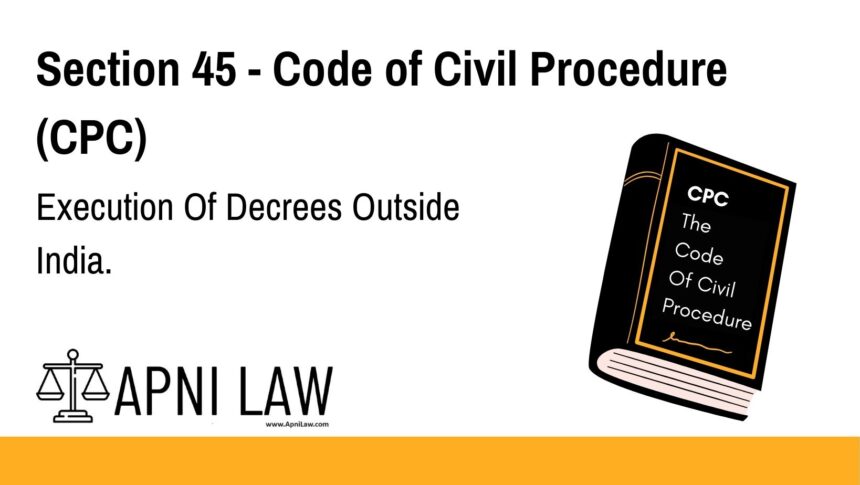Code
CPC1[45]. Execution of decrees outside India.– So much of the foregoing sections of this Part as
empowers a Court to send a decree for execution to another Court shall be construed as empowering a
Court in any State to send a decree for execution to any Court established2*** by the authority of the Central Government3[outside India] to which the State Government has by notification in the Official
Gazette declared this section to apply.]
Perfect 👍 Let’s draft the SEO-optimized structured article for Section 45 CPC – Execution of Decrees Outside India in the ApniLaw format with proper internal linking.
Section 45 CPC: Execution of Decrees Outside India
Code
Section 45 – Code of Civil Procedure, 1908
So much of the foregoing sections of this Part as empowers a Court to send a decree for execution to another Court shall be construed as empowering a Court in any State to send a decree for execution to any Court established by the authority of the Central Government outside India to which the State Government has by notification in the Official Gazette declared this section to apply.
📖 Source: Section 45 CPC – Execution of Decrees Outside India (ApniLaw)
Explanation
Section 45 CPC extends the execution of decrees beyond the territorial boundaries of India.
Key Highlights:
- Normally, under Section 38 CPC and Section 39 CPC, a decree can be sent for execution to another Court within India.
- Section 45 expands this power by allowing Indian Courts to send decrees for execution to a Court established outside India.
- Such a Court must be established by the authority of the Central Government.
- The State Government must, by notification in the Official Gazette, declare this section applicable to that Court.
This provision ensures that Indian decrees do not lose their force when parties or properties are located outside India but within territories where Indian-established Courts exist.
Illustrations
- Example 1:
A Court in Delhi passes a money decree against a defendant who later shifts to an area outside India where a Court is established under the authority of the Central Government. The decree can be sent for execution there if the State Government notifies applicability. - Example 2:
A property dispute decree passed in Chennai requires execution in a foreign territory administered by an Indian-established Court. Under Section 45 CPC, execution is legally possible.
Common Questions and Answers
1. What is the purpose of Section 45 CPC?
It facilitates the execution of decrees outside India in Courts set up by the Central Government, ensuring effective enforcement beyond India’s geographical limits.
2. Is Section 45 CPC the same as Section 44A CPC?
No.
- Section 45 CPC: Applies to execution in Courts established by the Central Government outside India.
- Section 44A CPC: Deals with execution of foreign decrees passed by Courts in reciprocating territories.
3. Who notifies the applicability of Section 45 CPC?
The State Government, through a notification in the Official Gazette.
4. Can any foreign Court execute an Indian decree under Section 45 CPC?
No. Only Courts established outside India by the authority of the Central Government and notified by the State Government fall under this section.
Conclusion
Section 45 CPC ensures that decrees passed in India can be executed outside India in Courts established by the Central Government, provided the State Government notifies applicability.
This provision strengthens the enforceability of Indian decrees internationally, especially in territories where Indian-established Courts function.
👉 Read more: Section 45 CPC – Execution of Decrees Outside India (ApniLaw)








